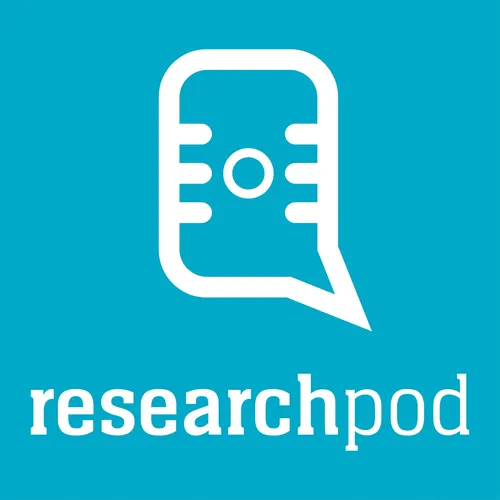
ResearchPod
ResearchPod science podcasts connect the research community to a global audience of peers and the public, raising visibility and impact. www.researchpod.org. All content is shared under the Creative Commons CCBY-NC-ND 4.0 licence. For further information, email [email protected]
- Update frequency
- every 3 days
- Average duration
- 18 minutes
- Episodes
- 486
- Years Active
- 2019 - 2025

What does it mean to be a responsible business in a post-pandemic world?
The pandemic disrupted leaders on every level. It forced them to re-examine their assumptions about their organisation’s purpose and place in society. It impacted their perceptions and their actions …

Health, happiness and humanitarian disasters: Resilience and wellbeing during crises
Modern life can feel like one of constant crisis, through exposure on social media feeds, local news or even your personal life. Recovering from the physical and emotional toll of these is hard, but …

How data science can transform Lebanon’s public sector
While data science can transform public sector policy-making, places like Lebanon lack the data infrastructure and governance rules needed to support public sector data analysis.
Professor Lama Mouss…

Informal learning experiences with big data visualisation
Many of us first experience the concept of learning in formal school settings, but how do we learn in non-formal settings like museums and zoos?
This is a question that Professor Joe E Heimlich and c…

Open Access at a mission-led university press
In this episode of the Transforming Society podcast, Jess Miles speaks with Julia Mortimer, Journals Director and Head of Open Access at Bristol University Press.
They discuss recent developments in O…

Robotics and autonomy: From space robots to applications in daily life
Robots play an important part in our everyday lives. Non-autonomous systems can be found in industry, surgical theatres, and even our homes, and more autonomous robots are integral to space and deep-…

Medical advice and patients with mental health conditions: Legal rights in Singapore
Communication and consent are key in doctor-patient relationships. Doctors need to know what’s expected of them, and patients have the right to receive adequate information about diagnosis and treatm…

Who gets left behind in the race for renewables?
In this episode of the Transforming Society podcast, Richard Kemp speaks with Ed Atkins, author of A Just Energy Transition: Getting Decarbonisation Right in a Time of Crisis, about what is needed fo…

Leadership through crisis: Can one person do it all?
Since 2020, various crises have disrupted leaders on every level and have led to the emergence of some new and welcome leadership styles. In this episode, Professor Veronica Hope Hailey and her guest…

A holistic model of health inequalities in the regions of the Czech Republic
What are the spatial factors influencing health inequalities within a socio-economically homogeneous country?
Dana Hübelová, Alice Kozumplíková, and colleagues from Mendel University in Brno investiga…

Transformational change through public policy
In this episode, Oscar Berglund and Elizabeth A. Koebele, Co-Editors of the Policy & Politics journal, talk to Jess Miles about the latest special issue – ‘Transformational change through public poli…

A Noteworthy Aid? The learning benefits of a social annotation tool
How can social annotation transform traditional reading into a collaborative learning experience?
Damijana Keržič and Vida Zorko from the University of Ljubljana delve into this question through their…

Philosophical-Policy & Legal Design
When decisions need to be made in politics, business or daily life, it's worth giving all due care to The Problem to be solved, and The Action to be taken. This is also the foundation of classical p…

Publishing to address society’s greatest social challenges
In this episode, Alison Shaw, Chief Executive of Bristol University Press, talks about 25 years of publishing with a purpose to mark the end of the Press’ anniversary celebration year.
Alison speaks t…

Flipons: DNA flips the way a cell works
What are the risks versus rewards when challenging norms and pushing new boundaries in the quest for scientific discovery?
Dr Alan Herbert, President and Founder of InsideOutBio, gives an honest acco…

Developing AI for an anti-fascist future
In this episode, Richard Kemp speaks with Dan McQuillan, author of Resisting AI: An Anti-fascist Approach to Artificial Intelligence, about what artificial intelligence really is.
They discuss how art…

Science, AI, and securing a sustainable future
Stefan Brunnhuber is a medical director, chief medical officer and professor in Germany, and takes an evolutionary, human-centric approach to economics and psychology and looks towards a sustainable…

How can torture be tackled more effectively?
In this episode of the Transforming Society podcast, Jess Miles speaks with Malcolm Evans, former Chair of the UN Subcommittee on the Prevention of Torture and author of Tackling Torture: Prevention …

The Material Limit of Chemical Substance
While the sciences naturally evoke complex philosophical questions, the philosophy of science itself remains a relatively new discipline.
José Antonio Chamizo, an esteemed researcher in organometall…

Can we use chemiluminescence to probe the immune system activity?
Oxygen is activated quantum-mechanically in the body to act against bacterial infections.
Professor Robert C Allen shows that the antibacterial action of oxygen can be monitored by measuring the ligh…